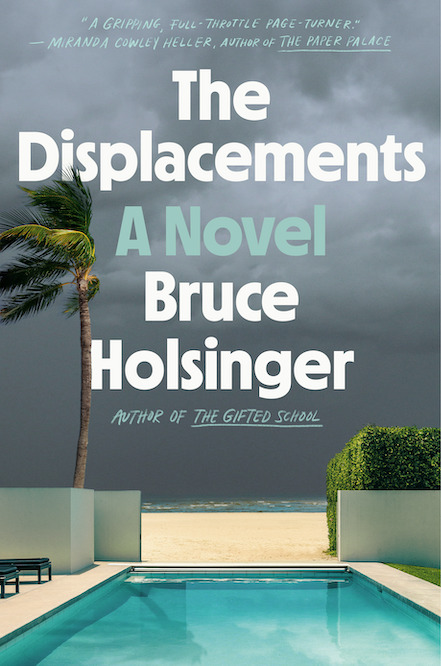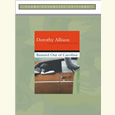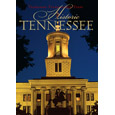Cutting Remembrances
Kevin Powers, author of The Yellow Birds, discusses the delicate art of writing about war
FROM THE CHAPTER 16 ARCHIVE: This interview originally appeared on May 13, 2013.
***
A native of Richmond, Virginia, Kevin Powers enlisted in the Army straight out of high school and eventually served as a machine gunner and bomb disposal officer in Iraq. After his honorable discharge, Powers returned home and wrote The Yellow Birds, a frequently harrowing and hypnotic account of the relationship between Privates John Bartle and Daniel Murphy. At the novel’s outset, “Bart” has promised to protect the younger “Murph,” but it’s clear that he will somehow fail to keep this promise. The non-linear narrative moves back and forth from Al Tafar, Iraq, to Richmond, Virginia; Fort Dix, New Jersey; and, eventually, Fort Knox, Kentucky. The story of this friendship and the awesome sense of responsibility a soldier feels for the lives of his comrades in the midst of the senselessness of war provides a platform for searing meditations on life and love between mothers and sons and brothers in arms.
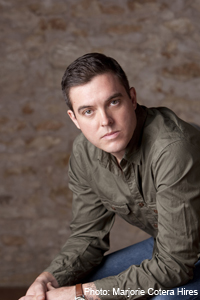 Powers—who initially entered the Michener Center for Writers at UT-Austin to study poetry—demonstrates a startling facility for translating the surreal and tragic nature of war and its lingering effects into vivid images and penetrating insights. Of a cathedral Bartle visits after his return to Richmond, for example, Powers writes: “It was a beautiful place, the most beautiful I’d seen in a long time. But it was a sad kind of beauty, like all things created to cover the ugly reason they existed.” Of marks Bartle has made on a wall, trying to reconstitute his memory of the war: “As I made my mark, if I remember right, the chalk broke and the mark became much shorter than I could recall intending, and what did it mean that this choice was an illusion, that all choices are illusions, or that if they are not illusions, their strength is illusory, for one choice must contend with the choices of all the other men and women deciding anything in that moment?” Of the Muslim call to prayer heard while hunkered down on a rooftop anticipating a firefight: “It was a sign and we knew what it meant, that hours had passed, that we had drawn nearer to our purpose, which was as vague and foreign as the indistinguishable dawns and dusks with which it came.”
Powers—who initially entered the Michener Center for Writers at UT-Austin to study poetry—demonstrates a startling facility for translating the surreal and tragic nature of war and its lingering effects into vivid images and penetrating insights. Of a cathedral Bartle visits after his return to Richmond, for example, Powers writes: “It was a beautiful place, the most beautiful I’d seen in a long time. But it was a sad kind of beauty, like all things created to cover the ugly reason they existed.” Of marks Bartle has made on a wall, trying to reconstitute his memory of the war: “As I made my mark, if I remember right, the chalk broke and the mark became much shorter than I could recall intending, and what did it mean that this choice was an illusion, that all choices are illusions, or that if they are not illusions, their strength is illusory, for one choice must contend with the choices of all the other men and women deciding anything in that moment?” Of the Muslim call to prayer heard while hunkered down on a rooftop anticipating a firefight: “It was a sign and we knew what it meant, that hours had passed, that we had drawn nearer to our purpose, which was as vague and foreign as the indistinguishable dawns and dusks with which it came.”
A National Book Award Finalist and winner of the PEN/Hemingway Award for First Fiction, The Yellow Birds has been hailed by a host of literary luminaries as an instant classic. Ann Patchett called it “inexplicably beautiful;” Jarhead author Anthony Swofford deemed it “a powerful work of art” on par with the work of Tim O’Brien and Ernest Hemingway. The notoriously discerning Tom Wolfe proclaimed it “the All Quiet on the Western Front of America’s Arab wars.” Written in lyrical prose that veers between terse understatement and vivid figurative language, The Yellow Birds is a rich literary experience as well as a harrowing narrative about the effects of war on both soldiers and families. Prior to his visit to Nashville, Kevin Powers answered questions from Chapter 16 via email:
Chapter 16: You joined the Army pretty much straight out of high school. Did you already have a sense then that you wanted to be a writer and that war would be your subject?
Kevin Powers: Well, I knew I wanted to be a writer but didn’t have the slightest idea how to go about doing it, besides by writing, of course. The decision to join the Army was unrelated, except in the sense that I thought it would open up some opportunities for me, which it did.
Chapter 16: You’ve received enormous acclaim for The Yellow Birds. How has this great success so early in your writing career influenced your approach to writing or your conception of yourself as a literary artist?
Powers: It’s flattering, and it has given me the freedom to continue writing for the time being, but my approach to my work is fundamentally the same as it’s always been. I want to tell the stories and describe the images that are pretty much always swirling around in my head. Sometimes I’m able to, and sometimes I’m not. Pleasant as it may be, everything else is background noise.
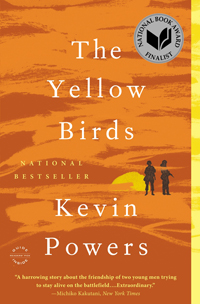 Chapter 16: Are you surprised by the way the novel has been received? Did you set out to write “the All Quiet on the Western Front of America’s Arab wars?”
Chapter 16: Are you surprised by the way the novel has been received? Did you set out to write “the All Quiet on the Western Front of America’s Arab wars?”
Powers: I’ll answer your second question first. No. And of course I’m surprised. I thought some people would appreciate it, but I had no idea what would happen beyond that.
Chapter 16: How did you manage the challenge of making actual, lived experiences as true and real on the page as they felt when you experienced them? Most readers feel as if you have been very successful in rendering these kinds of experiences with accuracy and authority—do you agree with them?
Powers: Even though I experienced things that are in the same ballpark as the events in the book, the events themselves are imagined. I tried to create enough space in the book for readers to imagine themselves into it.
Chapter 16: Do you have more stories to tell about your war service, perhaps returning to that time in your life in the same way that, say, Tim O’Brien returns to Vietnam?
Powers: Right now I’m interested in other settings and other stories, but I’ll probably always be interested in certain aspects of that experience. Questions about violence’s relationship to justice and injustice, and the way that dynamic impacts people and communities, will probably always play a role in whatever I happen to be working on.
Chapter 16: You are a poet as well as a fiction writer. How different is your process for writing poetry from your approach to fiction writing? Now that you’ve been acknowledged as a fiction writer of such tremendous promise, do you feel torn between the genres?
Powers: I don’t feel torn at all. Being acknowledged is great, but I write because I derive a singular satisfaction from the challenges both genres provide. The difference is in the duration and intensity of the work. But it’s all work.
Kevin Powers will discuss The Yellow Birds at Parnassus Books in Nashville on May 21 at 6:30 p.m. as part of the Wine with the Author series. The event is free and open to the public.

